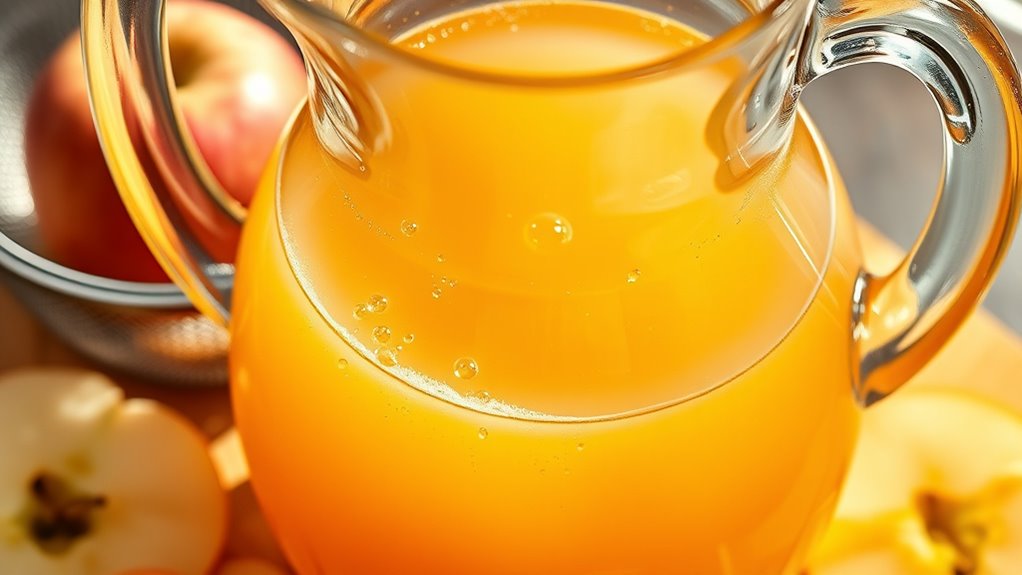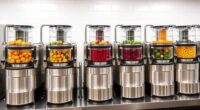Enzyme treatment helps you produce clear apple juice by breaking down pectins and other molecules that cause cloudiness. You’ll typically add enzymes like pectinases during processing under controlled conditions like suitable pH, temperature, and gentle agitation. Proper handling guarantees consistent results, better clarity, and high-quality juice. Understanding how to optimize enzyme use can improve your production process. Keep exploring to learn more about effective enzyme applications and future innovations.
Key Takeaways
- Enzymes like pectinases break down pectins, reducing cloudiness and enhancing apple juice clarity.
- Proper enzyme selection and optimal conditions (pH, temperature) are essential for effective clarification.
- Enzymes are added under controlled conditions to ensure uniform activity and prevent over-processing.
- Post-treatment, enzyme activity is halted to preserve juice quality and prevent flavor or stability issues.
- Using high-quality, stable enzymes improves clarity, reduces processing time, and maintains juice flavor and nutrients.
Understanding the Role of Enzymes in Apple Juice Clarification
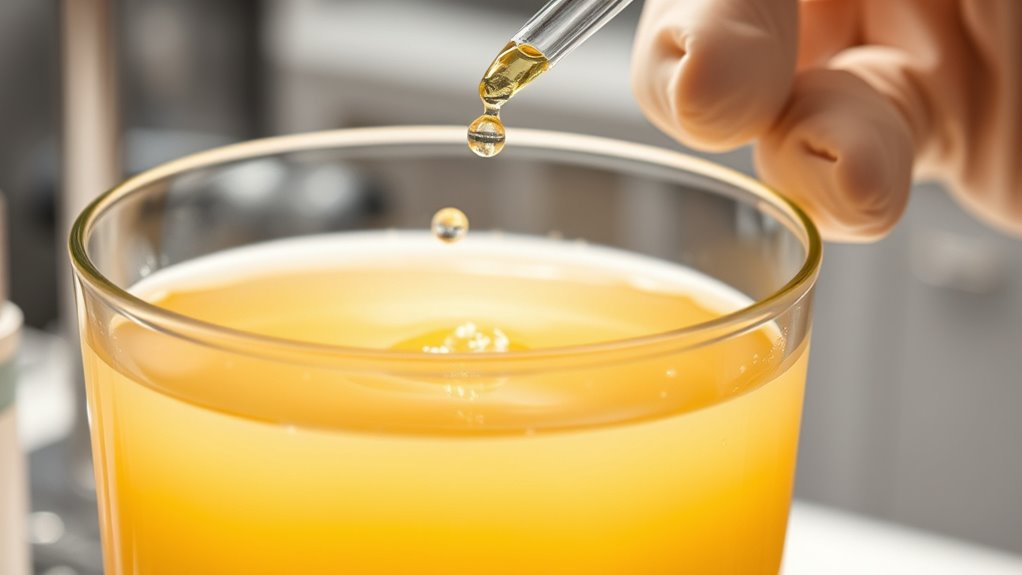
Enzymes play a vital role in apple juice clarification by breaking down complex molecules that cause cloudiness. When selecting enzymes, enzyme purity is crucial, as pure enzymes ensure consistent results and prevent unwanted side reactions that could affect flavor retention. High enzyme purity means fewer impurities, which helps preserve the natural taste of your apple juice. Proper enzyme activity targets specific pectins and other polysaccharides that trap particles, clearing the juice effectively. This process not only improves clarity but also maintains the juice’s authentic flavor. Additionally, understanding the enzyme stability during processing can help optimize the clarification process further, ensuring your apple juice is both clear and flavorful without compromising quality. Ensuring the enzymes used are compatible with processing conditions can significantly enhance the efficiency and outcome of the clarification. Moreover, selecting enzymes with high activity levels ensures more effective breakdown of clouding agents, leading to a clearer final product. Incorporating enzymes with specific substrate affinity can further improve the precision of the clarification process and minimize residual cloudiness.
Types of Enzymes Used in Apple Juice Processing
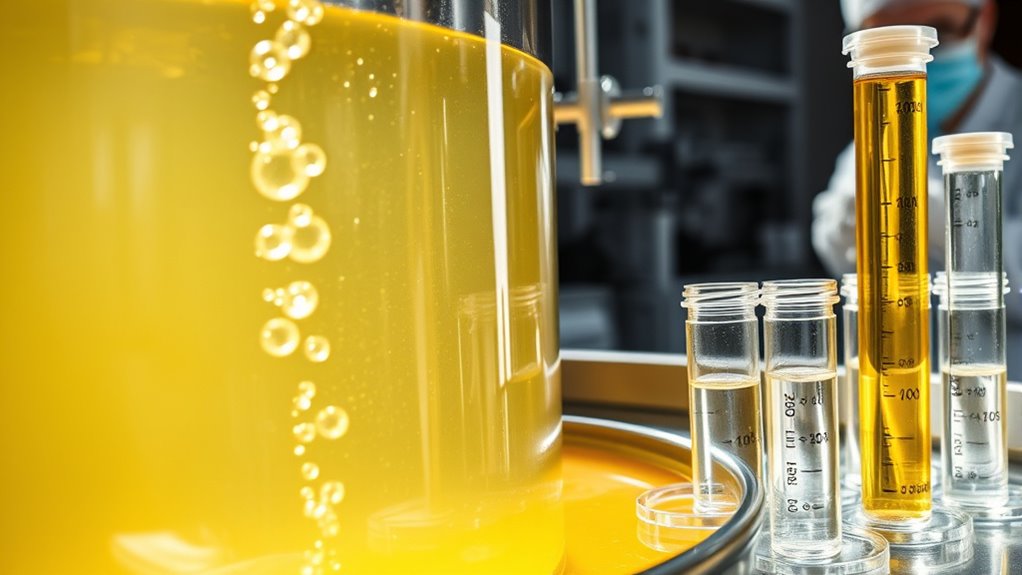
Several types of enzymes are vital for effective apple juice processing, each targeting specific components to improve clarity and quality. Pectinases are the most common, breaking down pectin to reduce cloudiness and increase clarity. Cellulases and hemicellulases help break down cell walls, releasing more juice and further clarifying the liquid. When choosing enzymes, enzyme stability is paramount; you need enzymes that withstand processing conditions without losing activity. Sourcing enzymes from reputable suppliers ensures consistent quality and performance. Different enzyme preparations may vary in stability and effectiveness, so selecting the right type depends on your specific processing needs. Proper enzyme sourcing guarantees you get high-quality enzymes that perform reliably, leading to a clearer, more appealing apple juice product. Additionally, employing best airless paint sprayers can streamline cleaning and maintenance, ensuring consistent performance and longevity of your equipment. Moreover, understanding enzyme stability is crucial to maintaining enzyme activity throughout the processing stages.
The Process of Enzyme Treatment in Juice Production
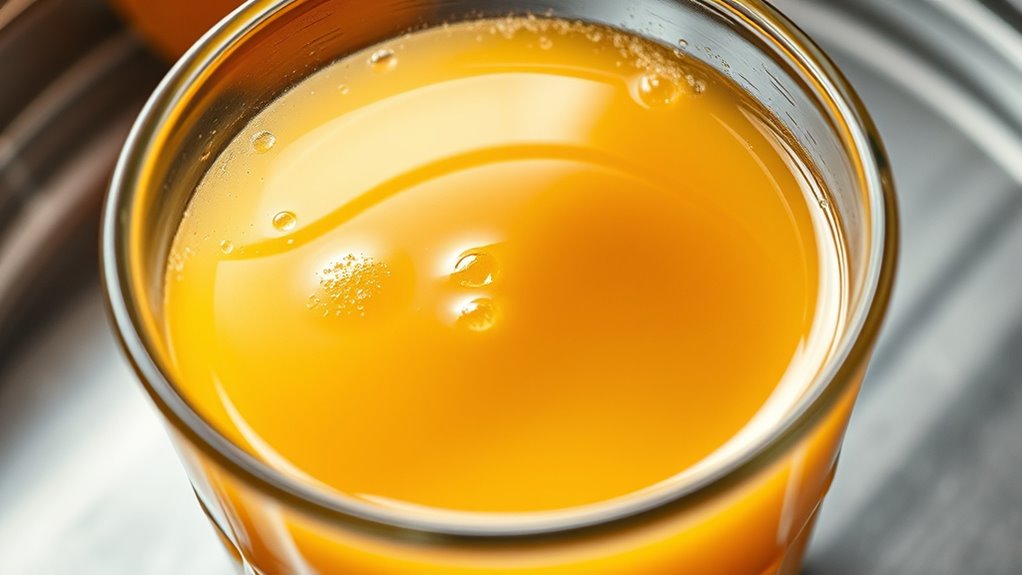
The enzyme treatment process begins by preparing the apple mash or juice, ensuring ideal conditions for enzyme activity. You need to control temperature, pH, and oxygen levels to optimize enzyme stability, which is vital for effective breakdown of pectin and other substances. Once the mixture is ready, you add the specific enzymes and allow them to act for a set period, typically under gentle agitation. Proper timing ensures maximum clarity without over-processing. After treatment, it’s important to quickly halt enzyme activity to prevent degradation, often by adjusting temperature or pH. Store the enzyme-treated juice under recommended storage conditions to preserve enzyme stability and prevent spoilage. Maintaining optimal conditions throughout the process is essential for achieving the desired clarity and quality. Additionally, understanding the technology behind enzyme applications can help optimize the process for different batches and desired results. Using precise control measures can also help prevent overprocessing, which might negatively affect juice flavor and texture. Recognizing the importance of data privacy challenges is crucial when utilizing digital monitoring systems in modern enzyme treatments. Employing advanced monitoring techniques can further enhance consistency and product quality during enzyme treatment.
Benefits of Using Enzymes for Juice Clarity and Quality
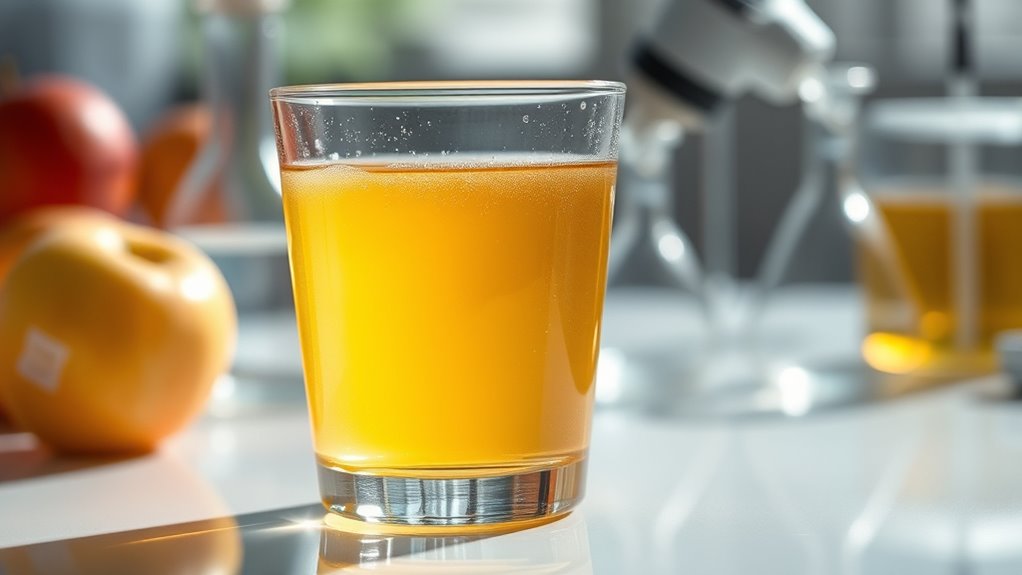
By utilizing enzymes in apple juice production, you can considerably enhance the clarity and overall quality of the final product. Enzymes improve clarity by breaking down pectins, which cause cloudiness, resulting in a cleaner, more appealing juice. Their stability during processing ensures consistent performance, leading to reliable results over time. Sourcing high-quality enzymes from reputable suppliers guarantees enzyme activity remains strong, maximizing benefits. Using stable enzymes also reduces the need for additional clarification steps, saving you time and costs. Additionally, enzyme treatment preserves juice flavor and nutrients, boosting overall quality. Incorporating goal setting and planning can further optimize your production process and ensure consistent results. Hackathons, such as virtual or internal events, can foster innovation and accelerate the development of improved enzyme formulations or processing techniques. Proper enzyme sourcing and maintaining enzyme stability are essential for achieving a clear, high-quality apple juice that meets consumer expectations and aligns with regulatory compliance standards.
Factors Influencing Enzyme Effectiveness

Understanding the factors that influence enzyme effectiveness is essential for optimizing apple juice clarity and quality. Enzyme stability plays a vital role; if enzymes degrade before acting, clarity suffers. pH optimization is equally important—enzymes function best within specific pH ranges, typically around 3.0 to 4.5 for apple juice. To highlight this, consider the following:
| Factor | Effect on Enzymes | Recommendation |
|---|---|---|
| pH level | Affects enzyme activity and stability | Maintain pH within ideal range |
| Temperature | Impacts enzyme stability and speed | Keep temperature steady |
| Storage duration | Degrades enzyme effectiveness | Use enzymes promptly |
| Enzyme concentration | Influences clarity and processing time | Adjust based on juice volume |
Steps to Optimize Enzyme Treatment in Commercial Production
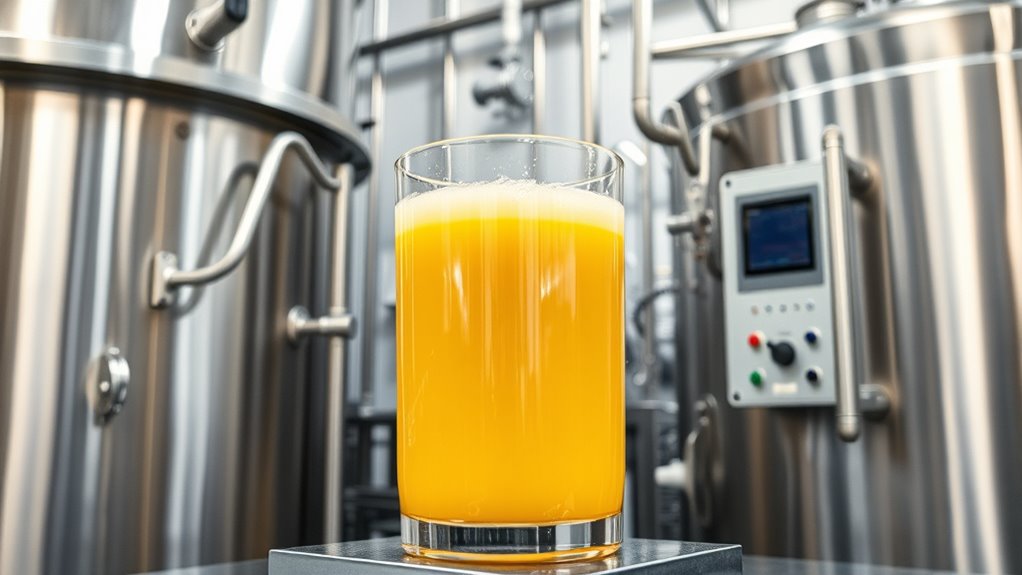
To optimize enzyme treatment in commercial apple juice production, you need to carefully control key process parameters. First, ensure enzymes are sourced from reputable suppliers to guarantee consistent enzyme stability and activity. Proper storage of enzymes at recommended temperatures maintains their effectiveness over time. During treatment, monitor temperature closely; ideal temperatures enhance enzyme stability and efficiency without causing denaturation. Adjust pH levels to match the enzyme’s ideal range, ensuring maximum activity. Precise timing of enzyme addition allows for complete reaction without overexposure. Regularly validate enzyme activity before use to maintain quality. Additionally, selecting appropriate enzyme types based on the specific juice characteristics can significantly improve clarity and yield. It is also beneficial to consider enzyme stabilization techniques that can further enhance enzyme performance during processing. Implementing these quality control measures ensures consistent results and optimal enzyme activity throughout production. Maintaining enzyme stability through proper handling and processing conditions can lead to more reliable and efficient extraction. Properly controlling process parameters such as temperature and pH is crucial for maximizing enzyme effectiveness and ensuring a high-quality product. By sourcing high-quality enzymes and maintaining optimal conditions, you maximize clarity and yield, making your process more efficient and consistent. These steps help ensure enzyme stability, leading to a successful enzyme treatment process.
Potential Challenges and Solutions in Enzyme Application
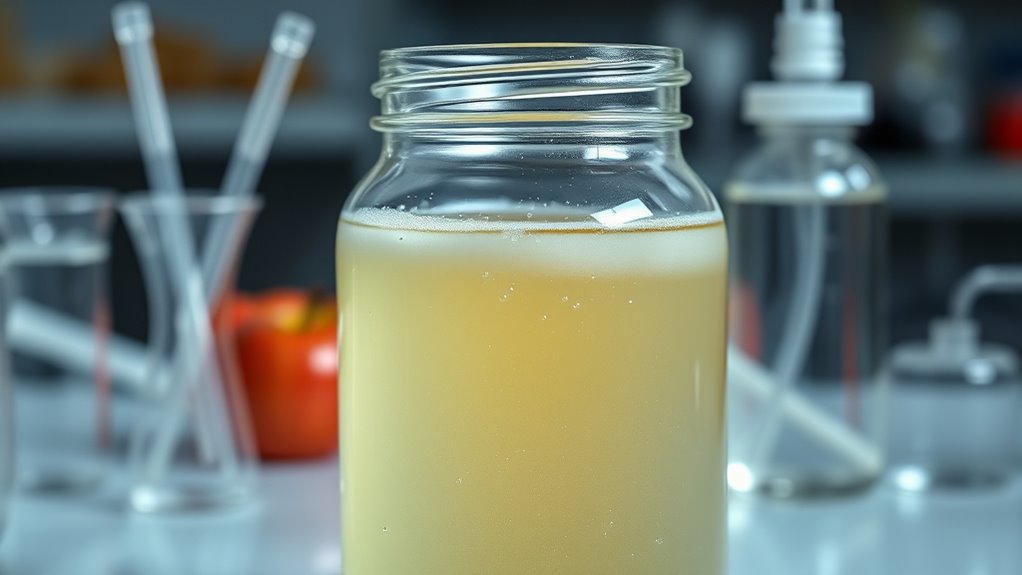
Applying enzymes in apple juice production can present several challenges, such as enzyme instability under varying process conditions and the risk of incomplete reactions. Ensuring enzyme stability is essential; fluctuations in temperature, pH, or storage can reduce efficacy. Proper storage conditions are crucial to maintaining enzyme activity over time. Additionally, understanding the enzyme’s stability profiles helps in selecting the most suitable enzyme for specific processing conditions. Regularly assessing enzyme activity during production can help optimize outcomes and prevent losses. The composition of apple juice itself can influence enzyme performance, necessitating tailored approaches. Regulatory challenges also complicate enzyme use, as approvals vary by region and require thorough documentation. To address these issues, you can:
- Select enzymes with proven stability profiles
- Optimize process parameters for enzyme activity
- Monitor enzyme performance regularly
- Maintain proper storage conditions
- Stay updated on regional regulatory requirements
Future Trends in Enzyme Technology for Fruit Juice Manufacturing
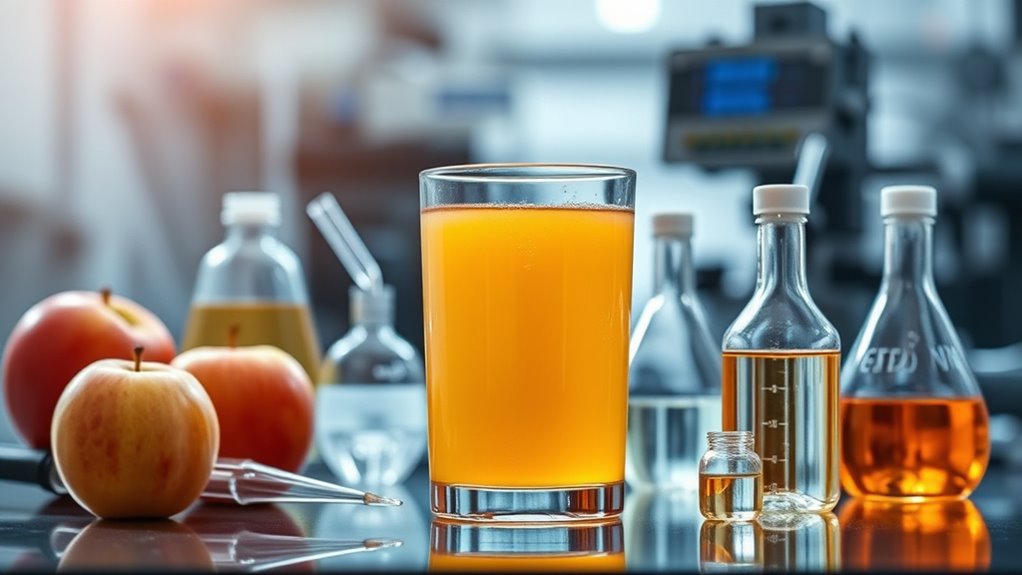
Future advancements in enzyme technology will focus on increasing enzyme specificity to improve juice quality and processing efficiency. You’ll also see a shift toward more sustainable production methods that reduce environmental impact. Additionally, biotech innovations will enable the development of novel enzymes tailored for specific manufacturing needs.
Enhanced Enzyme Specificity
As enzyme technology advances, enhanced enzyme specificity emerges as a key trend shaping fruit juice manufacturing. You’ll see enzymes designed with greater enzyme selectivity, which targets specific substrates more effectively. This precision allows for cleaner separation of unwanted components, improving juice clarity and quality. Enhanced enzyme specificity reduces side reactions, leading to fewer off-flavors and higher yields. Researchers are developing tailored enzymes that act only on specific pectins or phenolic compounds, optimizing processing steps. This trend helps you produce more consistent, high-quality juices while minimizing enzyme use and waste.
- Precise targeting of pectin types
- Reduced processing time
- Lower enzyme dosages needed
- Minimized by-products and impurities
- Increased process control and efficiency
Sustainable Production Methods
Advancements in enzyme technology are paving the way for more sustainable fruit juice production. Improved enzyme stability means enzymes last longer under processing conditions, reducing waste and lowering environmental impact. This stability allows for higher enzyme efficiency, which minimizes the amount needed for each batch, directly supporting cost optimization. As enzymes become more durable and effective, manufacturers can reduce energy consumption and raw material use, making production more eco-friendly. Additionally, stable enzymes enable the use of milder processing conditions, decreasing the need for harsh chemicals and energy-intensive steps. Overall, these innovations help create a more sustainable and economically viable juice manufacturing process, aligning quality with environmental responsibility. You’ll find that embracing these advancements enhances both product quality and sustainability goals.
Biotech Innovation Advances
Biotech innovations are set to revolutionize enzyme technology in fruit juice manufacturing by enabling more precise and efficient processes. Advances focus on improving enzyme stability to withstand processing conditions and extend shelf life. Researchers are developing enzymes tailored for specific tasks, reducing the need for multiple treatments. Enhanced enzyme stability also means fewer adjustments during production, saving time and costs. Regulatory approval processes are becoming more streamlined, allowing quicker adoption of new biotechnologies. Future trends include genetically engineered enzymes with improved activity and stability, designed for ideal performance. These innovations will help create clearer, higher-quality juices with minimal additives. As a result, you’ll benefit from better product consistency, safety, and sustainability. The key developments include:
- Improved enzyme stability for harsh conditions
- Genetically engineered enzymes
- Faster regulatory approval pathways
- Increased process efficiency
- Reduced environmental impact
Frequently Asked Questions
How Long Does Enzyme Treatment Typically Take in Commercial Juice Production?
You might wonder how long enzyme activity duration lasts in commercial juice production. Typically, the ideal treatment times range from 30 minutes to a few hours, depending on the enzyme used and juice conditions. You should monitor enzyme activity closely to guarantee clarity without over-treating. Adjust your process based on the specific enzyme’s recommended ideal treatment times to achieve the best clarity and quality in your apple juice.
Are There Any Health Concerns Related to Enzyme Residues in Apple Juice?
You might think enzyme residue concerns are tiny, but they’re worth contemplating for your health safety. Generally, enzyme residues in apple juice are minimal and thoroughly broken down during processing, making health safety considerations quite low. Regulatory agencies ensure the enzymes used are safe and approved. Still, if you have allergies or sensitivities, it’s wise to check labels. Overall, commercially produced apple juice with enzyme treatment is safe for everyday consumption.
Can Enzyme Treatment Be Applied to Organic Apple Juice?
Yes, you can apply enzyme treatment to organic apple juice, but you need to guarantee it aligns with organic certification standards. Look for enzymes sourced from organic-certified suppliers to maintain your product’s organic status. Using approved enzymes helps clarify the juice without compromising organic integrity. Always verify the enzyme sourcing and certification to ensure your process stays compliant and meets organic regulations.
What Are the Environmental Impacts of Enzyme Use in Juice Clarification?
Imagine a juice producer reducing waste through enzyme use, which minimizes chemical usage and improves waste management. The environmental impacts of enzyme use in juice clarification are generally positive, supporting sustainable practices. Enzymes are biodegradable and help lower energy consumption during processing, reducing carbon footprints. However, improper disposal or overuse could lead to ecological concerns. Overall, responsible enzyme application benefits environmental health by promoting cleaner production methods.
How Does Enzyme Treatment Affect the Flavor Profile of Apple Juice?
You’ll notice that enzyme treatment can enhance the flavor profile of apple juice by boosting flavor enhancement and preserving the natural aroma. It breaks down pectin and other compounds, making the juice clearer and more vibrant. This process helps retain the fresh apple aroma, ensuring the beverage tastes more natural and appealing. Overall, enzyme use can improve both the clarity and sensory qualities, giving you a more enjoyable drinking experience.
Conclusion
By embracing enzyme technology, you reveal the true essence of apple juice, transforming cloudy chaos into crystal clarity. Think of enzymes as silent artisans, sculpting impurities into transparency, revealing the fruit’s purest spirit. With careful control and innovation, you can craft a product that reflects nature’s brilliance. Ultimately, enzyme treatment isn’t just a process—it’s a symbol of your commitment to purity, quality, and the art of perfecting nature’s gift for every sip.
Susannah expertise lies in researching and compiling evidence-based content on juicing, nutrition, and overall health. She is committed to ensuring that The Juicery World offers accurate, up-to-date, and trustworthy information to empower readers to take control of their health. Susannah’s goal is to inspire individuals to embrace juicing as a way to nourish their bodies and live their best lives.

